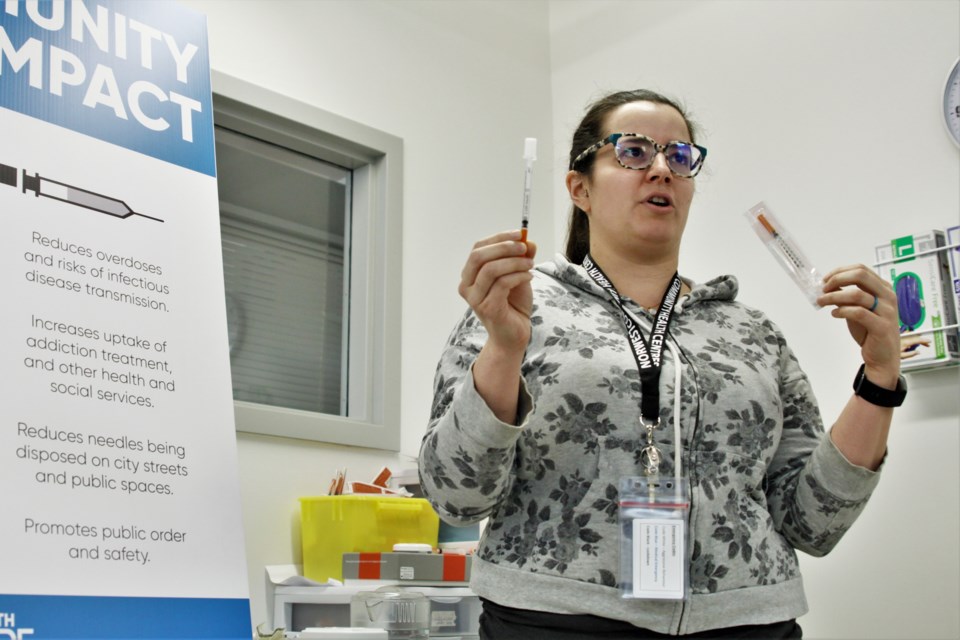THUNDER BAY – A growing body of evidence suggests safe injection sites help reduce overdose deaths and may encourage users to pursue detox treatments. But the sites are still seen as controversial by many governments and members of the public. Thunder Bay’s lone injection site, PATH525, looked to address concerns head-on with an open house over the weekend.
The site, run by Norwest Community Health Centres at their Simpson Street location, was opened in 2018 and recently expanded to operate seven days a week. It offers a safe environment, supervision by a registered nurse, and sterile equipment for drug users. On Sunday afternoon, community members were invited to see the space for themselves and ask questions.
Beyond reducing the likelihood of contamination and overdose, staff say one of the centre’s most important functions is to offer a safe, non-judgmental environment for vulnerable people. That can open doors for referrals to other health services, from finding primary medical care to accessing detox facilities.
“Probably the most pertinent piece of our work right now is just developing that relationship and rapport with the people who participate in this program,” says outreach worker Laurie Clarke. “That part is huge, because it’s through relationship that we can refer people to the services they need – services people might not normally access because of the lives they’re living.”
From its opening late in 2018, the site has seen usership increase substantially, going from a few dozen in early months to a record 500 visits from around 120 people in January of this year. An initial staff of two has expanded to around a dozen. Supervisor Brad King says it took time to get the word out and build up trust in the drug using community. King echoes Clarke’s emphasis on building trust, saying the stigma associated with addiction can keep people from seeking assistance.
“Stigma is probably the number one killer in terms of addictions,” he says. “We can only help the people that come in through our doors, and stigma keeps people out. We want to reduce that stigma, create a non-judgemental environment where people can have honest conversations about where they are and where they need to go.”
The addition of two outreach workers has helped the site get the word out and build relationships. Clarke and her colleague Julie Diner visit neighbourhoods and community groups to make connections, give presentations, and answer questions.
As well as promoting their services to potential users, the outreach workers try to build awareness about the site with the broader pulic. While she’s new to the job, having started in December, Clarke says the reaction she's heard has been positive.
“I’m really impressed with the community acceptance thus far,” she says. “I’m finding people of all ages and walks of life are really open to having the conversation.”
King agrees. He acknowledges safe injection sites tend to raise concerns and controversy, but says the Thunder Bay community seems to accept the need for them.
“The feedback I’ve gotten is overwhelmingly positive,” he says. “The complaints people have are that there aren’t more sites, or that we’re not a 24-hour service. I haven’t seen any real negative reaction, personally.”
King says an initial feasibility study suggested Thunder Bay could use multiple sites, and especially one in the north core downtown. A proposal from harm-reduction group Elevate, formerly AIDS Thunder Bay, to operate a north end site was not approved for funding by the provincial government. King isn’t aware of any plans to open further sites at the moment.
Diner, the site’s second outreach worker, also works at the Shelter House and sees the need for programs like PATH525 every day. At its heart, she says the service is about lifting stigma and treating those with addictions with humanity and compassion.
“People who are using opiates and injecting drugs – they are community members,” she says. “They deserve to be respected and recognized and looked at. They deserve to be treated like humans.”
Diner encourages those who want to know more, or who have concerns about the program, to visit future open houses and drop-in events.
